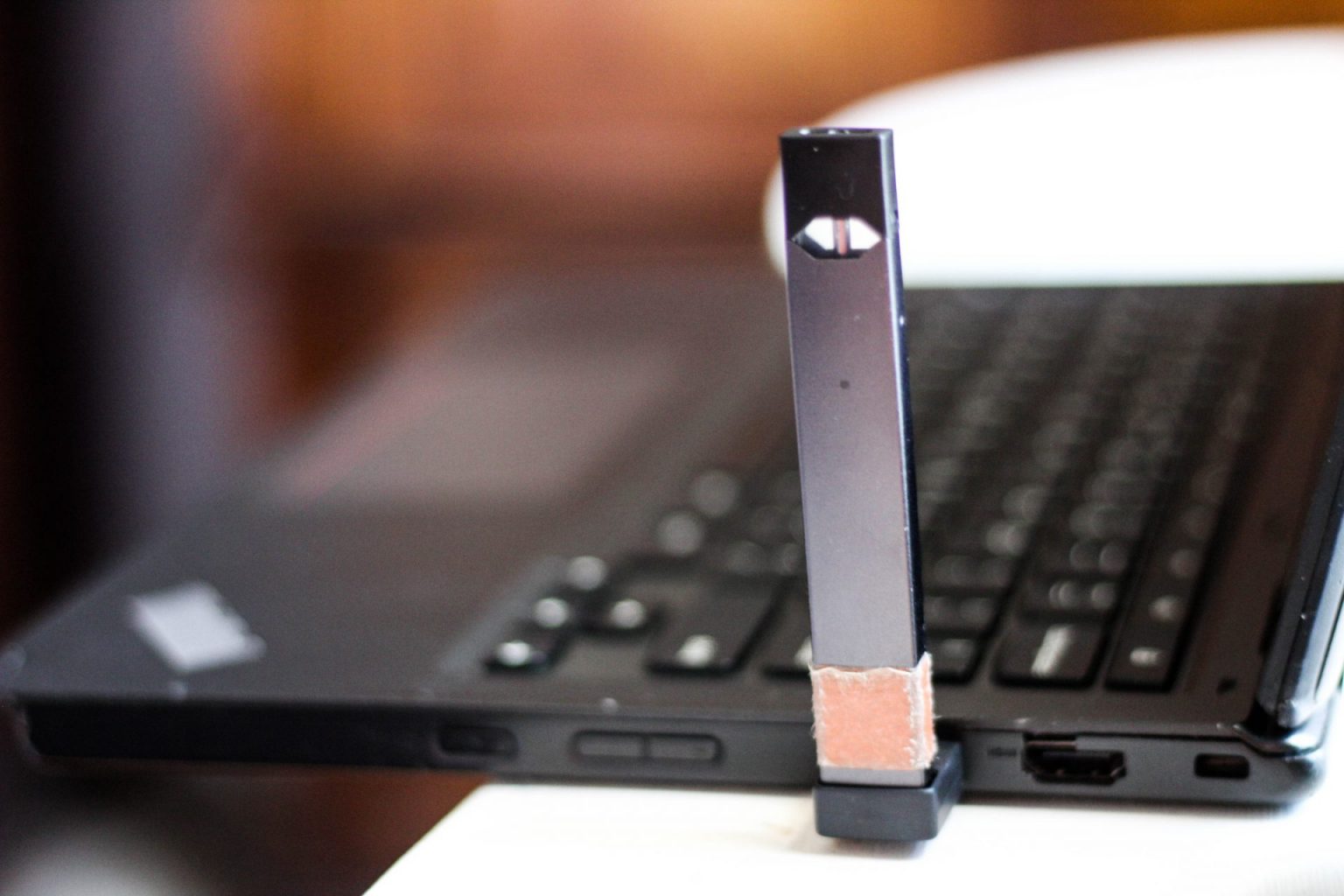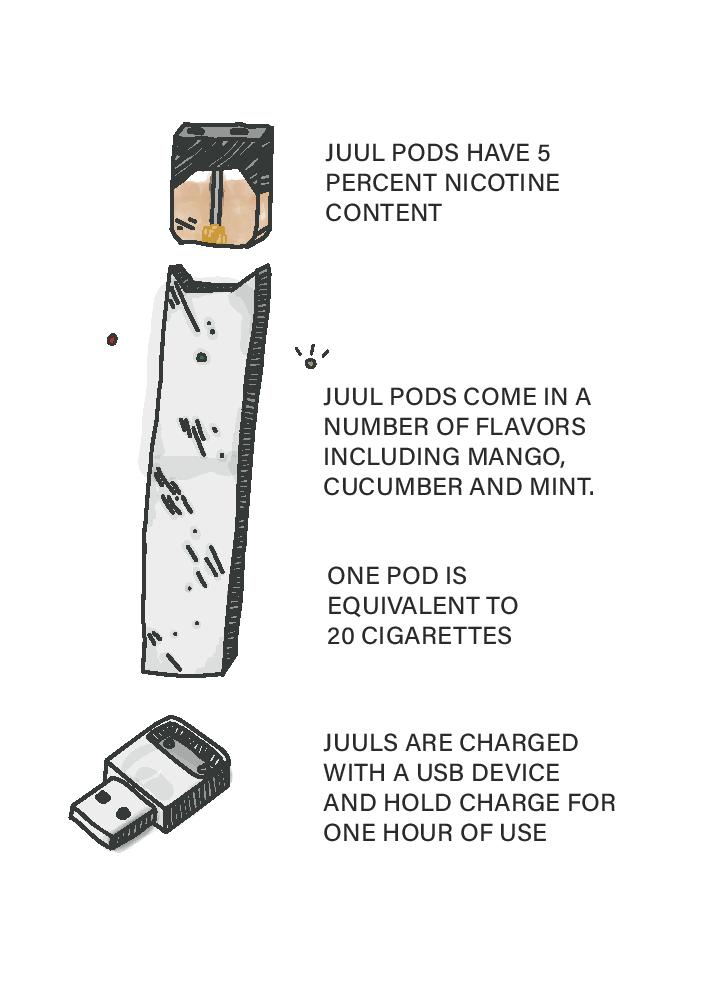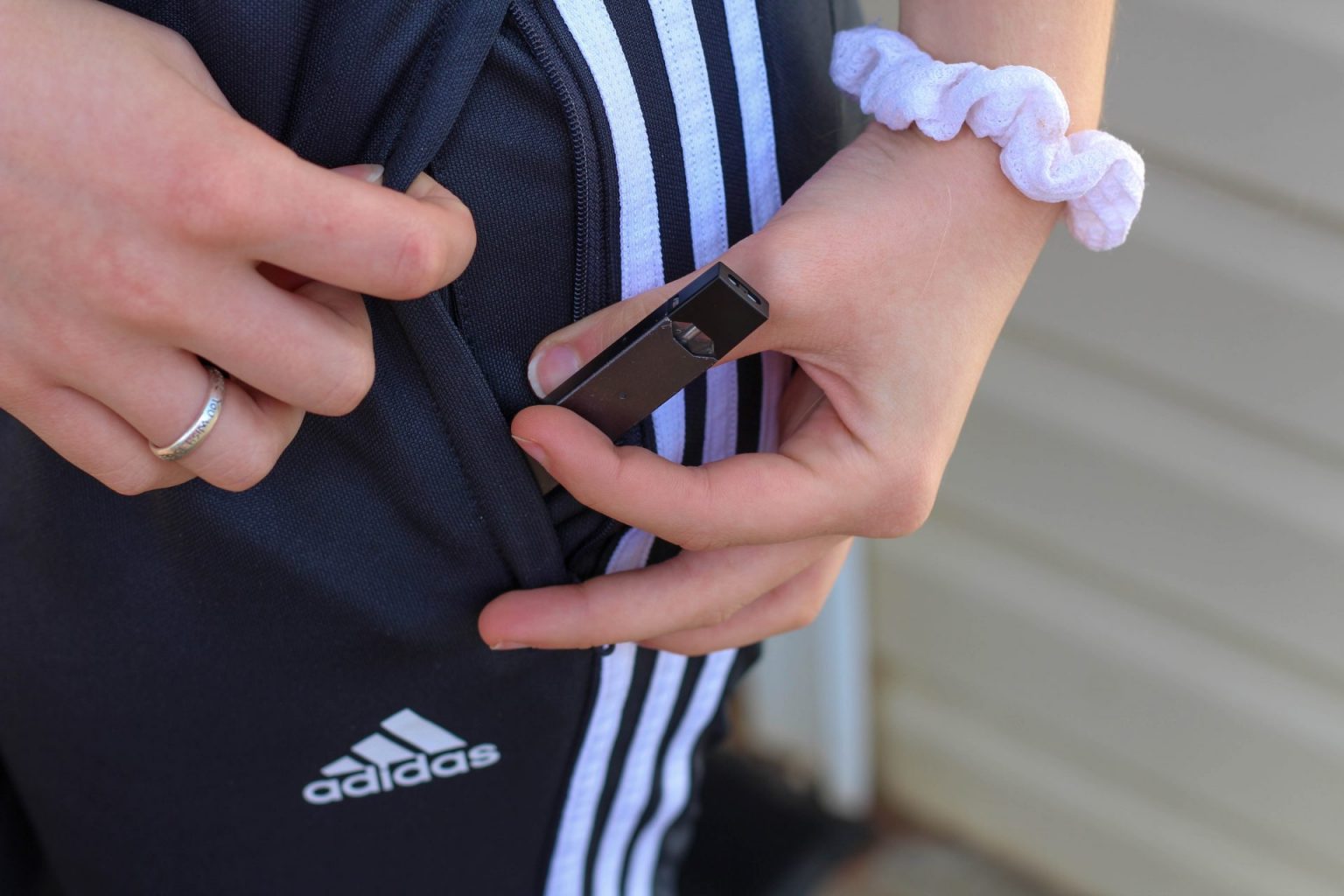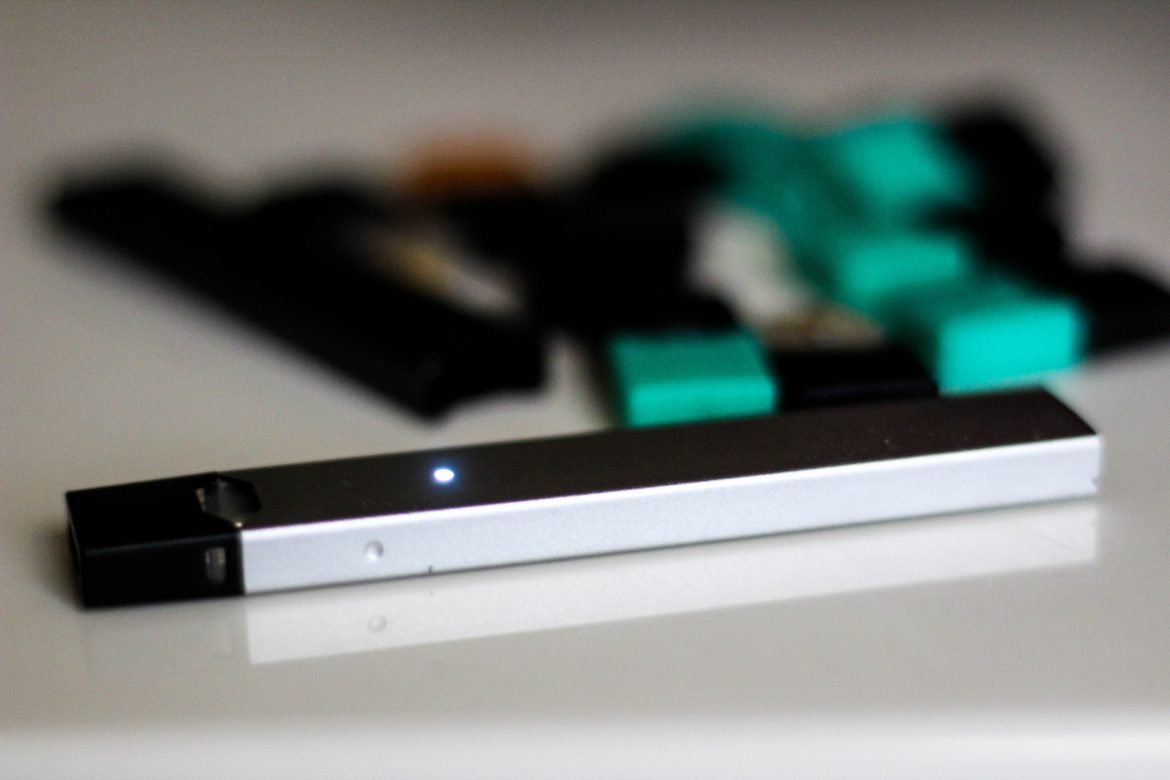A juul lays in front of multiple Juul pods. According to Clarke Central High School Principal Dr. Swade Huff, CCHS students caught with tobacco products such as Juuls on campus could face serious consequences. “In-school suspension and parental contact is pretty much the first mandate to hopefully minimize any future issues with that same student,” Huff said. Photo by Kelly Fulford
This story originally appeared in Volume 16, Issue 3 of the ODYSSEY Newsmagazine, and has been updated with new information and added multimedia for the web.
Although many Clarke Central High School students recognize Juuling as an activity that occurs among the student body, fewer are aware of the potential health consequences.
On Jan. 18, English department teacher Lisa Hill found one of her students engaging in an increasingly popular activity among high school students nationwide: hitting a Juul.
“It was during lunch,” Hill said. “A student was walking down the hallway blowing smoke out of their nose like nobody noticed, and then they dropped the Juul on the ground, which they also thought nobody noticed.”
The Center for Disease Control and Prevention defines JUUL as a brand of e-cigarette: a battery-powered, flash-drive-shaped device which heats a liquid containing nicotine to produce a vapor that can be smoked.
According to the December 2018 University of Michigan study “National Adolescent Drug Trends 2018,” there was an increase between 2017 and 2018 of 1.3 million additional high school vapers in the 30 days prior to the survey, the biggest year-to-year change in substance use since 1975.
Frequent nicotine use is particularly harmful to students within this age group, according to UGA health policy assistant professor Dr. Grace Adams.
“For people under the age of 25, their brains are still developing, and there’s evidence that nicotine actually hinders brain development, that it actually slows it down, and nicotine actually changes the way that memories are formed,” Adams said.
“For people under the age of 25, their brains are still developing, and there’s evidence that nicotine actually hinders brain development, that it actually slows it down, and nicotine actually changes the way that memories are formed.”
— Dr. Grace Adams,
UGA health policy assistant professor
According to the 2018-19 Clarke County School District Code of Conduct, e-cigarettes and vaping products fall under the definition of tobacco. The intentional use or knowledgeable possession of a tobacco product on school grounds could result in a parent conference or in-school suspension.
Consequences could vary from student to student, according to Assistant Principal Reginald Thomas.
“If somebody is getting caught, has tobacco and it’s the first time they’ve had it, as opposed to somebody else who has two or three cigars or something, and it’s their third or fourth time over the history of being in school, you weigh it differently,” Thomas said.
English department teacher Andy Dean, who found two students using e-cigarettes during the 2017-18 school year, followed a procedure which involved taking a product from a student.
“I was driving out of the student parking lot and there was a group of students that were vaping,” Dean said. “I said, ‘Please give it to me.’ Next day, I came to school, reported it to (school security) officer (Terry) Reid in the security office. He told me to write a referral. I ultimately didn’t write a referral, but I contacted the parents.”
According to sophomore Rachel Brooks*, her experience with discipline regarding use of a Juul was slightly different.
“One time, I was in the bathroom here, and I actually wasn’t doing it, but (a security guard) knocked on the door, because a student told the security guard that I was doing it in the bathroom,” Brooks said. “They came in and (a friend and I) weren’t doing anything, but they were like, ‘We’re gonna search your bags,’ and they searched our bags and they didn’t find anything. But they took it really seriously.”
School officials will only search students or their property when they have credible insight a student may be in possession of a forbidden product, according to Principal Dr. Swade Huff.
“When we get credible information from students or parents (that) a student may be in possession of tobacco products or other items, then we do have probable cause to search, and it’s not a violation,” Huff said. “It’s the authority that we have here at the school to take the appropriate steps to make sure the campus is a safe learning environment.”

A juul charges using a school-issued personal learning device. According to UGA assistant professor of health policy Dr. Grace Adams, Juuling is an activity many high schoolers have tried. “Among teens, one in five high schoolers, so around 21 percent, are currently either using e-cigarettes or juuling. But many more than that, over 50 percent, said that they had tried it,” Adams said. Photo by Kelly Fulford
Nearly 89 percent of CCHS students have seen a student using a Juul on the CCHS campus, according to a February poll of 425 students.
Senior Michael Ray*, who used a Juul regularly during the first semester of the 2018-19 school year, believed it was easy to use at school.
“(I used to Juul in) the bathroom. A couple times a day, I’d go to the bathroom and use it,” Ray said. “(Students) will get away with it. It’s so easy. It’s small, so it’s like a box, so you can just slide it in your pocket, and (no one will) know what it is. I don’t even know if teachers are up-to-date about it.”
Math department teacher Adam Osborne agrees that the discrete nature of products like Juuls can make them unnoticeable in the classroom.
“That would be the biggest thing, is like, no, you don’t see it, but you know it’s there, so it is a problem,” Osborne said. “A kid can be doing it in class, you can be an observant teacher, and you still never know. No, (I haven’t seen it happen in or near my class), but I have found empty pods in my class.”
According to federal law H.R.1865, which was passed on Dec. 20, 2019, it is prohibited for anyone under the age of 21 to purchase or possess tobacco products.
In January of 2020, the Federal Drug Administration finalized an enforcement policy that will target unauthorized flavors of e-cigarettes that are appealing to younger people, such as fruit or mint flavors.
However for students like Ray, accessing products was not difficult, despite not being of age.
“I had a friend bought it for me at first, and he was 18 or older, and then I had got (a fake) ID and I started buying. I just seen my friends doing it,” Ray said. “I saw a lot of people doing it, like college students, so I decided to try it out, and I just started liking it.”
Senior Jacob Dula also believes the locations where Juuls are sold could make them easier for students to purchase.
“It’s just so much easier to get. It’s at every gas station. If you’re getting something else to smoke, you have to be of age,” Dula said. “With a Juul, if you have a fake ID, you can walk into a gas station, get some pods, and you’re right out, like that.”

A graphic breaks down the differnt parts of a Juul. For senior Michael Ray*, obtaining a Juul involved outside resources. “A friend of mine that was in college had a friend that made some (fake IDs), so they made me one, and that’s how that went. I bought it from her for $40,” Ray said. Graphic by Audrey Kennedy and Katie Grace Upchurch
Adams believes there are several factors that lead young people to Juul.
“I think it’s marketed differently and also the flavors are marketed for youth,” Adams said. “Some of (the pods) are marketed to be particular desserts (…) and even specific candies that children especially would be really familiar with.”
Ray cites the sensation associated with Juuling as a factor in his former usage.
“It’s fun to do. And it’s hot right now, so every kid (wants to) do it now. It’s about a buzz,” Ray said. “You just get buzzed up, and your brain freezes, so I don’t know. It’s a good feeling.”
Additionally, for students like Dula, the specifics of the health risks may not be clear.
“They say it’s equivalent to like, 20 cigarettes, so I mean, it is harmful, but I’m not sure if the nicotine itself is harmful,” Dula said. “I’m not sure of the nicotine effects to someone, their brain, their respiratory system, anything like that. I think right now, it’s just like the wave. It’s what’s cool right now.”
Students such as senior Allen Joseph believe the addictive nature of nicotine helps perpetuate the usage of the product among the student body.
“(At) first, it was kinda cool, but now, everyone’s just addicted to nicotine,” Joseph said. “I know a lot of people, they won’t admit it, but they’re addicted to nicotine. It’ll start to be (a health issue for students), ’cause you know, eventually they’re gonna start moving on to like cigarettes and stuff, so it’ll just get worse and worse.”
Adams agrees that the addictive nature of nicotine has dangerous implications for students.
“You may say, ‘Oh, this is just something I’m doing for now,’ this is just something that they’re just kind of dabbling in or trying, but as soon as you expose yourself to that highly addictive substance, the likelihood that you don’t do it again or that you quit is pretty low,” Adams said.
“The misconception that it’s healthy is complicated, right, because it is in effect, healthier than regular cigarettes, but relative to not smoking at all, it is not a good alternative.”
— Dr. Grace Adams,
UGA health policy assistant professor
Adams also cites Juuling as a gateway for cigarette use.
“What the science shows there is that for young people who start with e-cigarettes and Juuls, they are way more likely to pick up regular cigarettes in the future, and then to be dual users (of e-cigarettes and cigarettes),” Adams said.
Adams cautions against the belief that e-cigarette usage is healthier than using traditional cigarettes.
“The misconception that it’s healthy is complicated, right, because it is in effect, healthier than regular cigarettes, but relative to not smoking at all, it is not a good alternative,” Adams said.
As members of the administrative team become more aware of e-cigarette and Juul usage among students, opinions differ throughout the community as to how disciplinary consequences should be handled.
“Like with any discipline referral, you do want to document it, and you want to contact the parent and talk to the student, of course,” Dunham said. “Any time it is a safety issue for the student, you want to bring that up to the student, because our main goal is for it not to happen again, and of course we want the student to be safe.”
For Adams, recognizing the severity of the issue at hand is a crucial first step for members of the school administration.

A person stealthily puts a Juul in their pocket. According to Clarke Central High School Principal Dr. Swade Huff, CCHS students caught with tobacco products such as Juuls on campus could face serious consequences. “In-school suspension and parental contact is pretty much the first mandate to hopefully minimize any future issues with that same student,” Huff said. Photo by Kelly Fulford
“Number one is that the teachers and administrators have to be really honest about the problem,” Adams said. “This is something a lot of teens are doing and there has to be education.”
Sophomore Becca Daniels* agrees that there is not enough awareness in the administration about student Juul usage, but believes there are more effective methods to prevent it.
“The school doesn’t know the extent of the issue, I believe,” Daniels said. “(The administration) should probably start with metal detectors instead of going straight to people and trying to search their bags.”
Osborne believes in finding a middle ground between a zero-tolerance policy and the current approach.
“I do know from like my master’s program and some different classes I had to take that, in terms of discipline, zero-tolerance policies don’t work by and large,” Osborne said. “I’m not really for (a) zero-tolerance policy in that regard. However, I would be less lenient in terms of (different consequences based on) first-offense, second-offense, if I was the one making the decision, but that’s above my pay grade.”
Daniels believes it is important that other students are aware of how truly addictive nicotine is.
“When you hit it at first, you’re gonna want it all the time. It’s true. It’s the case. You’re gonna sit there and be like, ‘I’m not addicted.’ But you’re gonna wanna hit it again,” Daniels said. “So, probably, if you haven’t started it, don’t start.”
*Certain sources have had their names changed in order to protect their identities.
Story by Valeria Garcia-Pozo
Package by Ireland McCage
